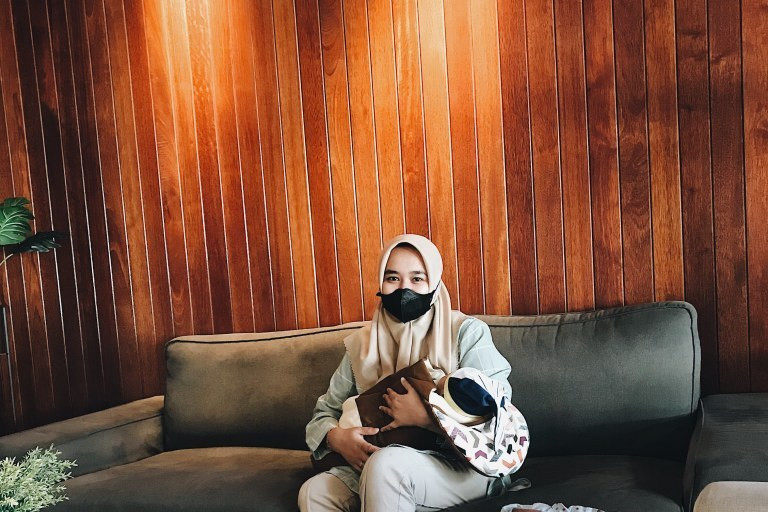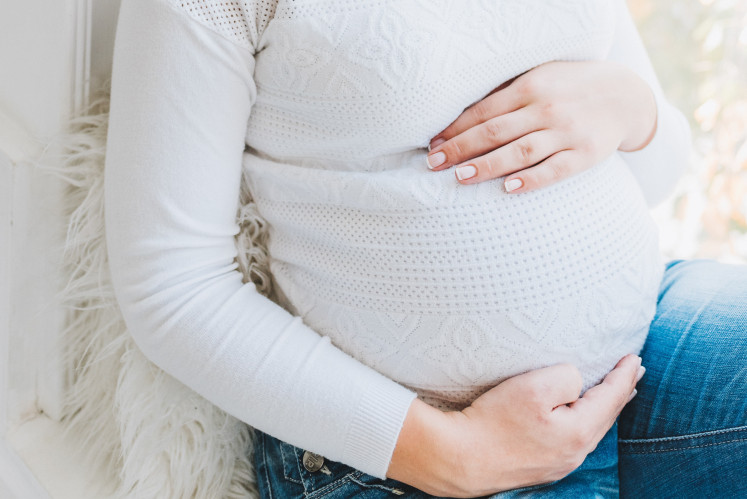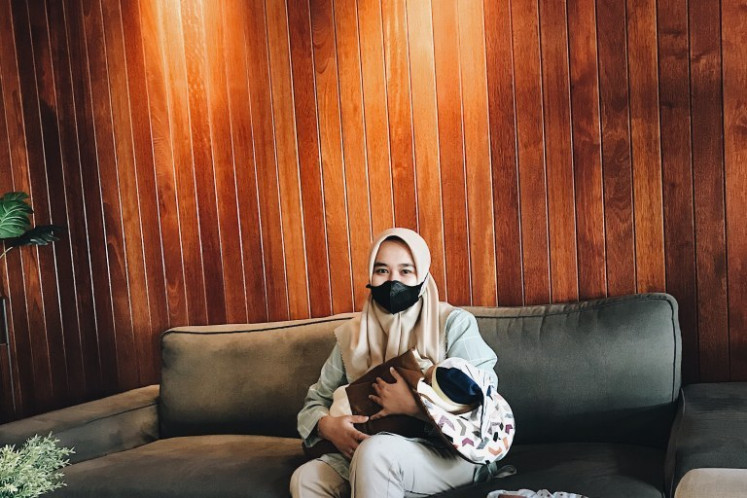Popular Reads
Top Results
Can't find what you're looking for?
View all search resultsPopular Reads
Top Results
Can't find what you're looking for?
View all search resultsDouble positive: stories of pregnant mothers with COVID-19
Women who faced both COVID-19 and pregnancy during the pandemic’s peak, share their stories
Change text size
Gift Premium Articles
to Anyone
W
omen who faced both pregnancy and COVID-19 during the peak of the pandemic went through unfathomable challenges that have remained with them until today.
When the pandemic peaked in mid-2021, expectant mothers faced the risk of terrifying complications as health services found themselves overwhelmed with cases.
As the disease was novel, medical experts could not yet tell how adversely the coronavirus would affect the mother and the child, both in the short and long run.
Constantly crying
Melia Aninda, a 27-year-old housewife from Jombang, East Java, was pregnant with her first child when she caught the virus in July. "I was nine months pregnant at that time, around the 37th or 38th week of pregnancy."
Melia's father and brother-in-law who lived nearby tested positive for COVID-19 two weeks before Melia started to notice symptoms. "I had a runny nose, high fever and anosmia. The emergency room [ER] suggested a swab, I finally got tested and it returned positive."
The family was devastated as Melia was expected to deliver the child just a few weeks away. "I kept thinking about giving birth in an isolation room. I didn't know if I could recover, especially since I had a friend who got COVID-19 when she was pregnant and [she passed away]."
Pregnancy comes with extra threats amidst the COVID-19 storm. (Unsplash/Courtesy of Anastasiia Chepinska) (Unsplash/Anastasiia Chepinska)The same fear was felt by Pia Devina, a 33-year-old mother from Karawang, West Java, who was 34 weeks pregnant when she was diagnosed with the virus in June. At the time, Pia was an employee for a medical equipment manufacturer. "Sometimes, when I checked Twitter, I would find news about pregnant women who had become infected by COVID-19 and, more often than not, the stories were sad. I cried and cried until my husband said, 'Stop reading the news. Focus on yourself, so you don't get stressed.'"
Breathing for two
Obstetricians usually prescribe a regime of supplements for pregnant mothers, depending on the conditions of the pregnancy. However, with the virus circulating within their bodies, expectant mothers who tested positive had to swallow even more bitter pills – literally.
"I took a mountain of medicine daily. I took the PCR test weekly," said Pia, who was carrying her second child at 34 weeks when she had to self-isolate. "It made me worried about the effect on the baby."
Melia, who was closer to her estimated due date than Pia, panicked when her breathing became more labored. "I was taken to the hospital [to get serious treatment]."
But securing a hospital spot in pandemic stricken Jombang was not an easy feat. The point was driven home when three hospitals denied her service. "My condition was not [deemed] serious because the saturation was still at 96," said Melia.
"I was told to go home and isolate myself and rest. It was feared that my condition would worsen if I had to be with other patients with more severe conditions."
She brought home a lot of prescription drugs. "I took around nine pills each round, for my baby and me, for the sake of healing so that the delivery could take place in an ordinary hospital room, not an isolated one."
Luckily, she found encouragement from her obstetrician. "My family suggested surgery because they were afraid that my condition would worsen. But my obstetrician was against that. [They said] if it's safe to wait it out, surgery was not necessary. I was told to wait and be positive."
After 10 days, Melia finally tested negative. Although it was past her due date, she successfully delivered in her desired condition. For Pia, who had her firstborn through C-section, she had to be isolated for three weeks.
Pia was advised by her relatives to find a health service provider in Bandung as the city had considerably more options. However, the test results kept coming back positive.
"The delivery was two weeks earlier than the estimated date because the doctor was worried that we would not be able to get the oxygen for surgery," said the mother of two.
"We were at the peak of the second wave. The doctor recommended that, at 38 weeks, the pregnancy was mature enough to give birth."
In the last two weeks of her isolation, Pia no longer experienced any symptoms. But because of the positive test results, she was not allowed to meet her own baby. "Three days in the hospital, I couldn't see the baby, and I was placed in an isolation room with other COVID-19 positive mothers."
The baby went home earlier than Pia. "By midnight, I was allowed to go home, but I still had to keep my distance from the baby," reminisced the private sector employee. "So I started breastfeeding my baby by wearing a mask, washing my hands and other precautionary procedures."
Well-deserved break
Sarlita Indah Permatasari, known as Lita, a 32-year-old obstetrician from Bandar Lampung, recalled her struggles in caring for COVID-positive expectant mothers.
"At the beginning of the pandemic, the Association of Indonesian Obstetricians and Gynecologists urged that we must limit practice hours and advise pregnant women [that they do not have to do the antenatal check-up every month]," said Lita.
Melia was beyond shocked when she found out that she was COVID-19 positive, days away from estimated delivery date. (Courtesy of Melia Nugraha) (Personal collection/Courtesy of Melia Nugraha)"But it was a dilemma, because [even before] many pregnant women miss regular check-ups during pregnancy [so they lack the education and supplements]."
Lita started handling COVID-positive patients in October 2020. "From October 2020 to May 2021, there was always at least one COVID-positive pregnant woman who had to deliver by C-section. But starting from June 2021, I had to treat at least two COVID-positive patients."
According to her, most of these mothers were infected by their husbands who still had to work from the office. Lita handled six C-section surgeries under layers of personal protective equipment in July alone. The procedure typically takes 30 to 90 minutes, minus the preparation and cleanup, but because of the restrictions it followed a different schedule.
"I usually did it late at night when the elective surgery schedule had finished in order to reduce the risk of contamination to non-COVID patients. As soon as it was finished, the room was disinfected until it was ready for the operation schedule for the next morning," said Lita, who eventually also contracted the virus during the hectic month.
"I have asthma. To protect myself and my parents, I had three PCR screenings in July, and the third one was positive," said the Sriwijaya University graduate.
Lita was forced to isolate for 11 days and could no longer help the pregnant women, but said she welcomed the chance to rest. "I was drained. Allah SWT kindly gave me this disease to make me rest for a while."
Dishonesty
As a frontliner in the fight against COVID-19, Lita lamented the mentality of some Indonesians in facing the pandemic, saying, "the government enforced community activities restrictions, but people didn't care."
The fact that people had the gall to lie about their status — endangering her fellow health professionals and other people — irked her the most. "Not all patients are honest. I met more than two dishonest patients who were ultimately caught [lying]," she said.
"It's really sad, we wanted to help them, but unfortunately, they selfishly hid their COVID-19 status. Obviously, it's detrimental to the people around them."
ohmg












